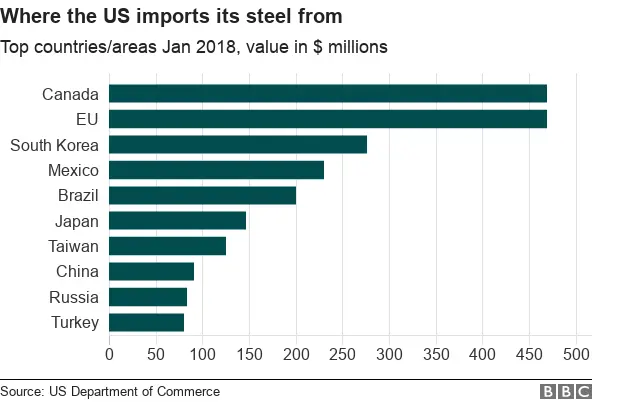Trump steel tariffs: IMF warns plan would hurt US
The International Monetary Fund (IMF) has joined criticism of Donald Trump's plan to impose a 25% tariff on steel imports and 10% on aluminium.
The body warned that such a move would hurt the US as well as other countries.
It said others could follow the US president's precedent by claiming tough trade restrictions were needed to defend national security.
Canada, the largest supplier of steel to the US, said tariffs would cause disruption on both sides of the border.
It is one of several countries that have said they will consider retaliatory steps if the president presses ahead with his plan next week.
EU trade chiefs are reportedly considering slapping 25% tariffs on around $3.5bn (£2.5bn) of imports from the US.
World Trade Organization Director General Roberto Azevedo said: "A trade war is in no one's interests."
But the rhetoric ramped up as Mr Trump tweeted, "Trade wars are good."

Are trade wars good?
By Theo Leggett, business correspondent
If trade wars really were good and easy to win, the World Trade Organisation probably wouldn't exist.
Most countries believe that negotiations are best carried out and disputes settled through a rules-based system. Introducing trade barriers on a tit-for-tat basis has the potential to harm companies on both sides.
But that's unlikely to bother Mr Trump. His campaign rhetoric drew heavily on the perceived threat to traditional US industries from foreign interlopers acting unfairly. He's simply continuing in that vein.
And it's unlikely to register much with the steelworkers of Pennsylvania and Indiana. Concerned about their jobs and the future, many will welcome Mr Trump's comments.

How has the Trump administration responded?
Mr Trump tweeted on Friday morning that the US was "losing billions of dollars on trade" and would find a trade war "easy to win".
Allow X content?
Critics argue that the tariffs would fail to protect American jobs and ultimately raise prices for consumers.
But US Commerce Secretary Wilbur Ross used a can of Campbell's Soup to defend the tariffs on Friday morning as "no big deal".

He told CNBC the duties would have a negligible effect on the price of a tin, amounting to less than a cent.
"Who in the world is going to be too bothered?" he asked.
Who else is unhappy?
Canada, Mexico, China, Japan and Brazil also say they are considering retaliatory steps.
The prime minister of Canada - which exports more steel to the US than any other country - slammed the tariffs as "absolutely unacceptable".
Justin Trudeau told reporters in Ontario he was "confident we're going to continue to be able to defend Canadian industry".
A Chinese foreign ministry spokesman said: "If all countries followed the example of the United States, [it] will undoubtedly result in a serious impact on the international trade order."
Kosei Shindo, chairman of the Japan Iron and Steel Federation, said that the move would "create a negative chain reaction affecting not only steel but also other products considered to have national security implications".
Many US companies also expressed alarm, including beer brewers, which use aluminium for canned beverages.
Anheuser-Busch InBev NV, the world's largest beer maker, warned that Mr Trump's plan was "going to put jobs at risk and would be against the US consumer".
What are the stakes for the US?
Mr Trump has lamented the decline of the US steel industry, which since 2000 has seen production drop from 112m tons to 86.5m tons in 2016.
The number of employees working in the sector has fallen over the same period from 135,000 to 83,600.
But experts say far more Americans work in industries that depend on steel products than are employed in steel plants.
Steel mills in 2015 employed about 140,000 Americans, according to census data.
But 6.5 million Americans work for manufacturers who make things using steel.
